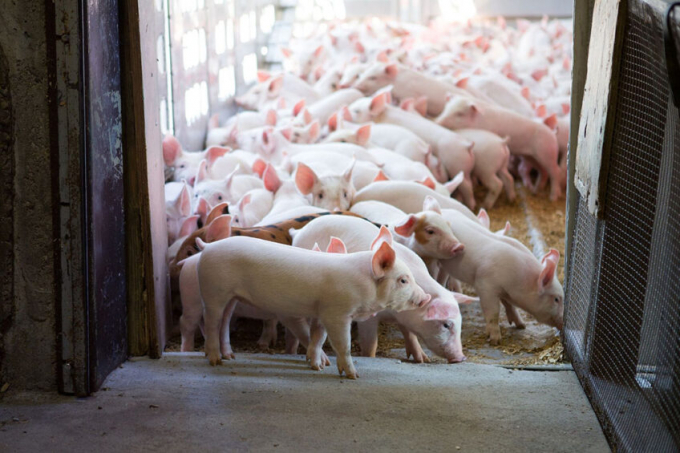June 15, 2025 | 09:20 GMT +7
June 15, 2025 | 09:20 GMT +7
Hotline: 0913.378.918
June 15, 2025 | 09:20 GMT +7
Hotline: 0913.378.918

Young piglets on a farm in Ontario. - Photo: Van Raay Farms/ The Whole Pig
What is pork production like in the various countries in both continents and what are the perspectives for development? Today: a deeper look at Canada.
Canada is the world’s third largest exporter of pork and live pigs, with exports representing about two-thirds of total production. Export is supported by an agency called Canada Pork.
Almost 30 million pigs were processed in Canada in 2020. Quebec leads all the other 9 provinces in the total number of pigs slaughtered, followed by Ontario, Manitoba, Alberta, Saskatchewan, British Columbia, Prince Edward Island and other provinces. Major Canadian pork companies include duBreton, Maple Leaf and Maple Lodge. Pig producers are represented by the Canadian Pork Council.
Pigs were first brought to what became Canada in 1598 by a French nobleman, about 70 years before Canada’s Confederation in 1867. Pigs were an important source of protein and fat for early settlers, along with wild game. ‘Salted pork’ preserved in heavy brine was also a staple at the lumber camps of Eastern Canada where square timbers were harvested for ship building domestically and in Europe.
Around the mid-1900s, wild boars were brought to Canada from Europe and mated to domestic pigs in order to provide new products. These enterprises failed and some hybrids either escaped or were freed. Their descendants have spread from British Columbia to Quebec and are causing problems with crop destruction and more. Wild pigs can also carry production diseases. Eradication is unlikely at this point, as population numbers continue to rise.
Main swine breeds in Canada
There are 5 main swine breeds in Canada: the Yorkshire, Landrace, Duroc, Hampshire and Lacombe. The Lacombe pig is the first livestock breed to be developed in Canada, registered in 1957. They are a hybrid of Landrace, Berkshire and Chester White, developed at the Agriculture & Agri-food Canada Research Centre in Lacombe, AL. The Lacombe is not commonly bred at this point.
Pig diseases in Canada include Porcine Reproductive and Respiratory Syndrome (PRRS), Porcine Epidemic Diarrhoea (PED), swine influenza and many others. Great amounts of ongoing effort are being made by government and industry to ensure Canada remains free from African Swine Fever (ASF), from public education and sniffer dogs at airports, to inspections of imports and much more.
Exports of Canadian pork products
Canada exports pork products to the US, China, Japan, Mexico, the Philippines, South Korea, Vietnam, Taiwan, Columbia, Panama and many other countries. Canada also exports feeder hogs to the US (4 million in 2021) as well as market pigs, sows and boars (1.3 million in 2021). Canada imports fresh, frozen and processed pork from the US, Germany, Mexico, Spain, Italy, Denmark and other countries.
The Canadian Ractopamine-Free Pork Certification Program provides assurance to international markets that basically all commercial pigs in Canada have never come in contact with the feed additive ractopamine, which is banned in many markets. That assurance is provided through thorough record keeping and routine audits at the farm, feed mills and federally-inspected processing plants (which handle all pork bound for export).
Sustainability and care programmes
Canada has many sustainability and animal care programmes in place. Canadian Pork Excellence is the national platform for the 3 on-farm programmes: PigTrace (traceability), PigSafe (food safety and biosecurity) and PigCare (animal health and welfare). Several swine transport companies have installed Transport Genie, a Canadian-made livestock trailer monitoring system that validates temperature and other trailer environment parameters. The system also automatically turns on fans and misters to keep trailer temperatures within a defined range.
A new 2022 report from Farm Credit Canada indicates that the lowered income and higher meat prices that many Canadians have experienced during the Covid-19 pandemic have driven an overall decline in meat consumption, including pork.
(The Pig Site)

(VAN) Extensive licensing requirements raise concerns about intellectual property theft.

(VAN) As of Friday, a salmonella outbreak linked to a California egg producer had sickened at least 79 people. Of the infected people, 21 hospitalizations were reported, U.S. health officials said.

(VAN) With the war ongoing, many Ukrainian farmers and rural farming families face limited access to their land due to mines and lack the financial resources to purchase needed agricultural inputs.

(VAN) Vikas Rambal has quietly built a $5 billion business empire in manufacturing, property and solar, and catapulted onto the Rich List.

(VAN) Available cropland now at less than five percent, according to latest geospatial assessment from FAO and UNOSAT.

(VAN) Alt Carbon has raised $12 million in a seed round as it plans to scale its carbon dioxide removal work in the South Asian nation.

(VAN) Attempts to bring down the price of the Japanese staple have had little effect amid a cost-of-living crisis.